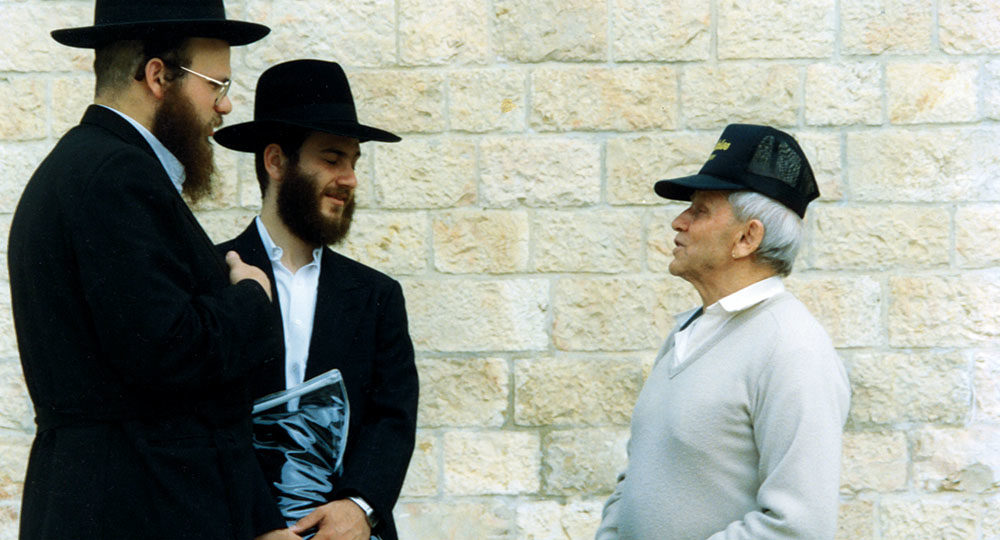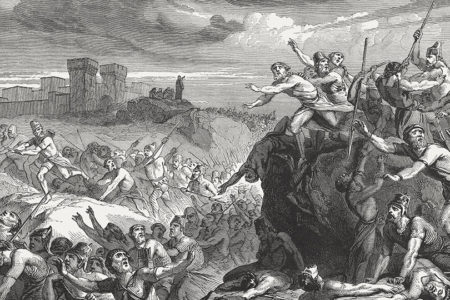A Tribute to Zvi
I first met Zvi Kalisher in 1977 on The Friends of Israel’s first tour to Israel. We had just arrived in Jerusalem, and that evening Zvi shared an hour-long testimony. I left the meeting saying to myself, No one could survive the Holocaust in Warsaw, Poland; immigrate to Israel as a young boy; fight in all Israel’s wars on the front lines, defusing mines; and survive—unless God supernaturally protected him and had a sovereign plan for his life.
Apart from God, there was no logical way to explain Zvi’s survival to the age of 86. In fact, 20 years earlier, Zvi had collapsed on a street in Jerusalem and, from all indications, was dead.
The paramedics revived him and took him to the hospital where he boldly witnessed to nurses and doctors alike. A week later he was sent home with no signs of any major physical or mental impairment, and he immediately went back to work.
Little did I know when we met that we would develop a 37-year-long personal friendship and ministry relationship that would enrich my life in ways I could never have imagined. As our bond grew, I learned that God gifted Zvi in ways I had not seen in other workers for the Lord.
Although his education was limited because of growing up in war-torn Poland during the Nazi occupation, Zvi was extremely intelligent. He spoke at least nine languages that he never formally studied and could switch languages in the middle of a conversation with no problem.
He also could easily recall facts about every state in the United States, many I barely knew—and I am an American.
Years ago, when I lived in Chicago, I showed him the city. He shared many facts on Chicago that surprised me, to say the least. Not only did he know much about Chicago and America, but he also knew a great deal about Israel, Europe, all the Arab countries in the Middle East, and the events taking place daily on the world scene. He was an avid reader and remembered everything he read.
Zvi could adapt to every situation at the snap of a finger. He never cowered to opposition but faced it head-on. His gift of discernment enabled him to read people and circumstances and know how to respond to them properly and effectively.
Bold and fearless in his witness for the Lord, Zvi was not afraid to speak honestly to men in high positions. Going into the lion’s den, so to speak, he would confront any man at any time for the Lord, whether a politician, high-ranking religious leader in Israel, or someone in the Arab community in Jerusalem. He did not wait for people to bring up spiritual issues. Instead, he created the opportunity and seized the moment.
Zvi had no religious training in Bible or theology or in how to share his faith. The only tool he had was God’s Word, which he memorized diligently. He could recall Scriptures quickly in both the Old and New Testaments. Zvi always carried a little blue Bible the size of his hand, consisting of both Testaments in Hebrew. And he always knew where to turn in it for any situation.
Unlike many, Zvi was unafraid to give out his name, address, and telephone number, making sure people could reach him if they wanted to talk. He often invited them over for dinner to have a spiritual conversation.
No one was as fearless as he. He was unafraid to face anyone for the Lord. I have not seen another man like him. The world has lost a lion of a witness of God’s love, mercy, and grace. It will be a long time before another Zvi emerges in Israel who will be as bold a witness in presenting Jesus as the Messiah to his people.
As for his lifestyle, he lived simply, with few material possessions, saving what he earned to help establish the futures of his four children and 16 grandchildren. His entire focus was to live for the Lord and use his time to share his faith in the Messiah.
In 1985 I was appointed director of International Ministries for The Friends of Israel (FOI). It was my job to develop our international work. One of my assignments was to spend a month each year in Israel, speaking and teaching in churches and Bible studies, acquainting Jewish believers with FOI, looking for new Israeli workers, and spending time ministering with our Israeli staff. This meant spending at least one week working with Zvi. Every day we would go throughout Jerusalem, talking to people in every context imaginable.
We would walk against the crowds, passing out tracts about Jesus. People would not throw them on the ground because they bore God’s name on the front. They would tuck them in their pockets and hopefully read them later. Some would stop, read the tract briefly, and confront us about what they read, sparking a lively discussion on whether Jesus was the Messiah.
We also would go every day into Mea She’arim, one of the oldest Jewish neighborhoods in Jerusalem. Established in 1874, it is the home of the Hasidic (ultra-Orthodox) Jewish community that adheres to strict Jewish law, prayer, and Bible study.
The Hasidic speak Yiddish in daily conversation, reserving Hebrew for prayer, religious study, and worship. They are intensely zealous in their religious beliefs and have been known to get physical with people who try to speak to them about Jesus.
Into this environment Zvi would go daily to speak tactfully about the Messiah of Israel.
We would go into a yeshiva (Jewish seminary) where men sat all day studying the Torah (Pentateuch) and Talmud. Zvi would sit down with a man who was in deep thought and open up a conversation on a Messianic passage from the Law.
A lively discussion would ensue, as other men would gather around to share their opinions. Sometimes the conversation would erupt into loud denials, shouting, and condemnation of Zvi’s interpretation of a Messianic passage. Yet Zvi was never rattled or out of control. He never grew angry but lovingly stood his ground, engaging people in conversation until they broke off the discussion.
I would listen, not understanding a word because the conversation was in Yiddish. Later Zvi would explain everything to me. I would even take pictures in the yeshiva (which was strictly forbidden), but no one said anything to me. Like the Amish, Hasidic Jews do not want their pictures taken. They often hide their faces or try to confiscate the camera. Such was never the case when I went with Zvi.
I know of no other believer in Israel who was as bold as he and went into a yeshiva to share his faith.
Zvi also would take me into a synagogue in Mea She’arim. He would take a Bible out of a bookcase, turn to Isaiah 53, tap a man on the shoulder, and ask, “Who is this speaking about?”
The man would read it and almost always admit he did not know of whom it spoke and say he needed to ask his rabbi. But this opened the door for conversation.
Every day we went to the Western Wall where Jewish men sit or stand to pray. Zvi would approach someone and ask what he was praying about. Often it was for the Messiah to come, rebuild the Temple, and bring peace to Israel.
So Zvi would ask, “How will you recognize the Messiah when He comes?” A conversation would ensue, with many men gathered around to listen and comment. Zvi would often bring the conversation around to teach how Jesus fulfilled the Jewish Scriptures as the Messiah.
When we brought Zvi to the United States to share his testimony at FOI banquets throughout the country, I would take him to synagogues, assisted-living homes, and schools. On one occasion in Wisconsin, Zvi talked to men in English, Yiddish, Hebrew, German, Polish, and Russian.
One year we scheduled special prophecy meetings on Prince Edward Island, Canada, and brought Zvi from Israel to share his testimony. By faith, we rented the civic auditorium that seated 1,000 people. The night Zvi gave his testimony, the place was filled to capacity. I will never forget that event. It also happened to be Zvi’s birthday. A cake was rolled out, and 1,000 people sang happy birthday to him.
Zvi was continually flooding us with reports on his ministry in Israel, of which you read only six per year in Israel My Glory. Each report filled the paper from the top of one side to the bottom of the flip side, with no margins. He used all the space available. He typed it on an old typewriter until 2013, when he became too ill to write. He wrote as he spoke, and it was a blessing to read each report.
Zvi was a unique servant of God. He lived in countries filled with conflict and war all his life. First, it was the struggle to survive the war years in Warsaw and escape the Nazis and gas chambers. Then it was the struggle through Israel’s battles to survive as a nation amid Arab aggression and calls for the Jewish state’s annihilation.
Listening to Zvi share his testimony with boldness and conviction was like witnessing a first-century apostle presenting the Messiah of Israel.
Through it all, God used Zvi Kalisher as a mighty witness to his people for more than 55 years with The Friends of Israel.
He and his ministry, though no longer with us, will never be forgotten. It was a privilege to be a part of his life. I will never forget my experiences with Zvi, and I will cherish his memory forever.








Zvi has been a great encouragement over the years here in New Zealand .
We host Isrealy’s here in New Zealand , tonight we had an Israeli girl tell his story to us which we already new
She shared with us that Zvi was her grandfather, that was such a blessing to us to have his granddaughter stay with us
I loved the story of Zvi as told by Elwood McQuade as well as the sequel. I have been in contact several times with Meno and appreciate their whole family.
I recall a banquet in Tulsa Okla
I had a Muslim friend with me that day . He was very impressed with Zvi. We attended OSU Oklahoma. My friend was of Jordan .
Later that year Said wanted to be sure about my Jesus.